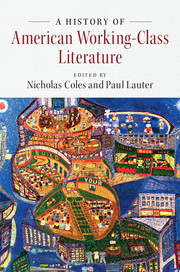
A History of American Working-Class Literature
- Editors:
- Nicholas Coles, University of Pittsburgh
- Paul Lauter
- Date Published: April 2017
- availability: Available
- format: Hardback
- isbn: 9781107103382
Hardback
Other available formats:
eBook
Looking for an examination copy?
This title is not currently available for examination. However, if you are interested in the title for your course we can consider offering an examination copy. To register your interest please contact [email protected] providing details of the course you are teaching.
-
A History of American Working-Class Literature sheds light not only on the lived experience of class but the enormously varied creativity of working-class people throughout the history of what is now the United States. By charting a chronology of working-class experience, as the conditions of work have changed over time, this volume shows how the practice of organizing, economic competition, place, and time shape opportunity and desire. The subjects range from transportation narratives and slave songs to the literature of deindustrialization and globalization. Among the literary forms discussed are memoir, journalism, film, drama, poetry, speeches, fiction, and song. Essays focus on plantation, prison, factory, and farm, as well as on labor unions, workers' theaters, and innovative publishing ventures. Chapters spotlight the intersections of class with race, gender, and place. The variety, depth, and many provocations of this History are certain to enrich the study and teaching of American literature.
Read more- Deals with literary texts from the early seventeenth to the early twenty-first centuries, providing students, teachers, and lay readers with an overview of a whole new field of study
- Essays examine a huge variety of written texts - poetry, songs, stories, memoir, journalism - as well as movies and other dramatic forms, showing the variety of working-class literary forms and broadening the idea of what constitutes 'literature'
- Presents working-class literary texts in relation to the social dynamics of class conflict and change, offering readers helpful ways of understanding relationships between historical struggles and cultural production
Reviews & endorsements
'Coles (Univ. of Pittsburgh) and Lauter (ret., Trinity College) bring together essays that challenge the notion of the 'American dream'. The essays contextualize the experience of the working class in the US and consider its representation in literature. … this collection appears at a time of extreme class inequality in the the US. To write about working class literature is a political act because it carries writers and readers beyond the text and into the realities of working-class lives. … Highly recommended. Upper-division undergraduates through faculty.' S. L. Rottschafer, CHOICE
Customer reviews
Not yet reviewed
Be the first to review
Review was not posted due to profanity
×Product details
- Date Published: April 2017
- format: Hardback
- isbn: 9781107103382
- length: 504 pages
- dimensions: 235 x 162 x 27 mm
- weight: 0.92kg
- availability: Available
Table of Contents
Introduction Nicholas Coles and Paul Lauter
1. Transportation narratives: servants, convicts, and the literature of colonization in British America Matthew Pethers
2. Why work? Early American theories and practices Paul Lauter
3. Labor and literary culture in and beyond bondage: early African-American expressive culture John Ernest
4. Lowell mill girls: women's work and writing in the early nineteenth century Christopher Hager
5. 'Wet paper between us': Whitman and the transformations of labor Peter Riley
6. Millions and mills: class and the ante-bellum novel Amy Schrager Lang
7. 'We are not slaves': the shadow of slavery in nineteenth-century poetry and song John Marsh
8. Utopian labors: work in nineteenth- and twentieth-century utopian and dystopian fiction James Catano
9. Towards a more perfect union: marriage plots in socialist fiction, 1901–17 Alicia Williamson
10. What workers were reading, 1830–1930 Jan Goggans
11. Getting the word out: institutions and forms of publication Mark Noonan
12. Genre and form in working-class life writing, from Haymarket to the New Deal Michael Collins
13. Working the fields: love and labor in farm fiction from 1890 to the Dust Bowl Nicholas Coles
14. Proletarian literature: fiction and the predicaments of class culture Lawrence Hanley
15. Go left young women: proletarian women writers Michelle Tokarczyk
16. 'I have seen black hands': a twentieth-century African American tradition Bill Mullen
17. The American labor song tradition Richard Flacks
18. Prison literature from the early Republic to Attica Joe Lockard
19. The workers' theatre of the twentieth century Amy Brady
20. The evolution of the poetry of work: from the Red Decade to the end of the Cold War Cary Nelson
21. The labor plot: one hundred years of class struggle and the silver screen Kathleen Newman
22. Globalization, migration, and contemporary working-class literature Joseph Entin
23. Narrating economic restructuring: working-class literature after deindustrialization Sherry Lee Linkon
24. A turn of the sphere: the place of class in intersectional analysis Sara Appel.
Sorry, this resource is locked
Please register or sign in to request access. If you are having problems accessing these resources please email [email protected]
Register Sign in» Proceed
You are now leaving the Cambridge University Press website. Your eBook purchase and download will be completed by our partner www.ebooks.com. Please see the permission section of the www.ebooks.com catalogue page for details of the print & copy limits on our eBooks.
Continue ×Are you sure you want to delete your account?
This cannot be undone.
Thank you for your feedback which will help us improve our service.
If you requested a response, we will make sure to get back to you shortly.
×